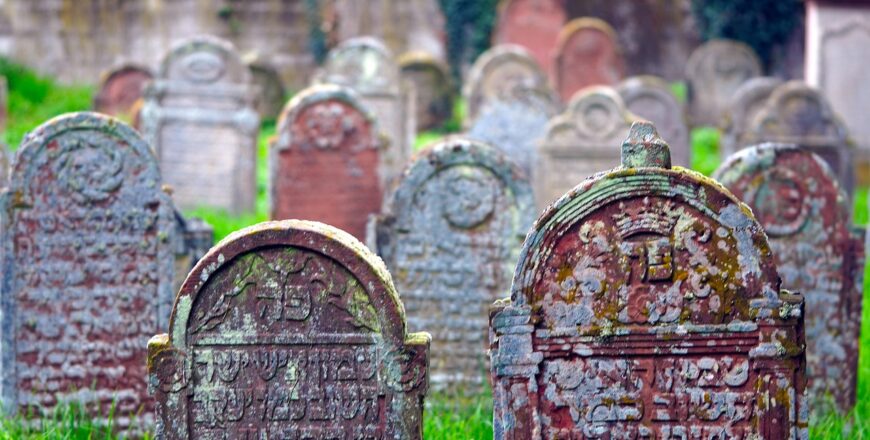Towards a More In-Depth Study of Death, Part Two: Adding Historical Context to the Records
- Description
- Curriculum
Building on the foundation established in Part 1, this advanced genealogy course dives deeper into the historical and cultural contexts surrounding death, mourning, and cemeteries. Participants will explore how social, economic, and political factors shaped how death was recorded and commemorated across different time periods in the United States. Topics include understanding the historical context behind death, mourning, and cemeteries. In addition, we will explore how to conduct thorough research that goes beyond typical genealogical sources. The course emphasizes the use of historical resources and archives to enrich genealogical research. By the end of this course, students will be equipped with advanced techniques to interpret their ancestors’ deaths and burials within a richer historical framework, uncovering new insights about their ancestors’ lives and communities. Class will be held on Thursdays, 10am-2pm Mountain Time, 11 September-13 November.
Week 1, 11 September
Counting the Departed: Understanding US Mortality Census Schedules and Their Historical Significance, 10:30-11:45
Instructor: Gena Philibert-Ortega This lecture explores the U.S. Mortality Census Schedules, an often-overlooked but invaluable resource for understanding historical demographic trends, public health, and social conditions in 19th-century America. Conducted between 1850 and 1900 alongside the decennial censuses, these schedules recorded deaths in the year preceding the census, offering insight into causes of death, disease patterns, and the impact of epidemics. By analyzing this data, historians can reconstruct the lived experiences of past generations, shedding light on regional disparities, racial and economic inequalities, and the evolution of medical knowledge. Through case studies and archival examples, this presentation will illustrate how mortality census records serve as a crucial tool for researchers in genealogy, epidemiology, and social history.
How Historians Research: The Historian’s Toolbox, 12:15-1:30
Instructor: Elise Ciregna, PhD
Genealogists use specific tools and ways of accessing information in their work. Similarly, in their work of decoding or interpreting the past, historians use a myriad of techniques or ways to flesh out the puzzle of the past they are researching. This session will address a number of different scenarios of “fact finding” and ways of answering historical research questions. If possible, provide questions or current challenges ahead of time for possible resolution or discussion and creative problem-solving in class.
Week 2, 18 September
The Death of Clara Grisham: An Intersection Between History and Genealogy Research, 10:30-11:45
Instructor: Gena Philibert-Ortega
From Jamestown to Plimouth: Unearthing the Burial Customs of America’s Earliest Settlers, 12:15-1:30
Instructor: Bonnie Wade Mucia
Delve into the historical contexts of Plimoth Colony and Historic Jamestowne, where America’s earliest settlers faced the harsh realities of colonial life. Our discussion will traverse the somber yet fascinating burial customs that these communities practiced, illuminated by recent archaeological findings and historical records.
Week 3, 25 September
The Lustrous Stone: Marble in the American Cemetery, 1780-1880, 10:30-11:45
Instructor: Elise Ciregna, PhD
The development of domestic American white marble quarries in Vermont in the 1780s presaged the end of the use of slate for gravestones. Slate had been the preferred medium for gravestones since the earliest Colonialists started marking graves. The fine white marble of Carrara, Italy was prized by wealthy Americans, but once white marble became available domestically and within reach of ordinary citizens, marble quickly replaced slate as the medium of choice for grave markers. The properties of marble that allowed it to be carved “in the round” opened a new vision for gravestones and monuments and their creation in an endless variety of sculptural shapes and motifs. This new vocabulary of expression saw its peak during the nineteenth century with the advent of the rural cemetery movement.
The Business of Burying: An Overview of Cemeteries in the US, 12:15-1:30
Instructor: Elise Ciregna, PhD
Cemeteries are, for many of us, sites of mystery, grounds belonging to those who lived in the past. In this talk I will demystify these American landscapes of death, exploring their role as vital, evolving, and organic spaces that have historically and contemporarily been important places for the living. We will consider burial grounds throughout history, from their beginnings as community spaces to the present, in which most cemeteries are part of a widespread for-profit industry. We will explore the different types of cemeteries you might encounter in your genealogical work. I will also touch briefly on the cemetery today as a public space for community engagement and celebration.
Week 4, 2 October
Studies of African American Cemeteries Through Time, 10:30-11:45
Instructor: Ari Wilkins
Battlefield to Cemetery: An Overview of American Civil War Deaths, Memory, and Research, 12:15-1:30
Instructor: Sarah Kay Bierle
What happened to Civil War soldiers who died? How were their families informed? Where were they buried? This presentation will walk through these solemn moments, examine the establishment of National Cemeteries and Confederate Cemeteries, and overview some records that are helpful for researching an ancestor’s Civil War fate or burial place. Additionally, this presentation will include research examples and cemetery case studies from Winchester National Cemetery and Stonewall Cemetery in Virginia’s Shenandoah Valley.
Week 5, 9 October
New Deal Necropolis: The WPA and the Preservation of America’s Cemeteries, 10:30-11:45
Instructor: Gena Philibert-Ortega
During the Great Depression, the Works Progress Administration (WPA) launched a series of ambitious projects aimed at providing employment while preserving America’s cultural and historical heritage. Among these efforts was the documentation and restoration of cemeteries across the United States. This lecture examines the WPA’s cemetery projects, which included headstone transcriptions, burial records indexing, and the physical restoration of neglected graveyards. These initiatives not only provided valuable employment opportunities but also created enduring records that remain crucial for genealogists, historians, and preservationists today. By exploring specific case studies and archival materials, this presentation will highlight the lasting impact of the WPA on cemetery preservation and the broader significance of cemeteries as historical landscapes.
Guiding History: The Role of Volunteer Docents at National Cemeteries, 12:15-1:30
Instructor: Bonnie Wade Mucia
Explore the impactful role of volunteer docents at National Cemeteries in this informative session. Ideal for those passionate about history and community service, this presentation delves into the responsibilities and experiences of docents who guide visitors through the sacred grounds, providing insights and narratives of those interred. Learn about the process of becoming a docent, the training involved, and the profound impact your presence can have on visitors and the preservation of historical memory.
Week 6, 16 October
Serving History: Volunteering as a Historican and Researching the Interred in National Cemeteries, 10:30-11:45
Instructor: Bonnie Wade Mucia
This presentation focuses on enhancing research skills related to individuals interred in National Cemeteries, emphasizing both theoretical approaches and practical applications. The session delves into effective methodologies for accessing and interpreting military records, researching cemetery archives, and utilizing genealogical databases. These strategies aim to uncover and document the rich, often untold, histories of veterans and other notable figures buried in sacred grounds. Attendees will explore the unique challenges and substantial rewards of this specialized research, acquiring the skills necessary to preserve and honor the legacies of those who have shaped our history. This seminar enhances participants’ research capabilities and fosters meaningful contributions to the broader narrative of national heritage.
Cemeteries, Casework, and Coming Home: Advanced Genealogy in Military Repatriation, 12:15-1:30
Instructor: Bonnie Wade Mucia
Military repatriation is more than just research—it’s a journey of return. In this advanced session, we explore how genealogists contribute to the identification and reburial of WWII soldiers, many originally interred in overseas cemeteries or mass graves at camps like Cabanatuan POW camp in the Philippines. See how genealogical casework culminates in meaningful reinterments at national cemeteries across the U.S., bringing peace to families and honoring the legacy of service.
Week 7, 23 October
From Shrouds to Showrooms: The Evolution of American Funerals, 10:30-11:45
Instructor: Gena Philibert-Ortega
The history of American funerals reflects broader social, religious, and economic changes, shaping how Americans have mourned their dead from the colonial era to the present. This lecture traces the evolution of funeral practices, from simple home burials and churchyard interments to the rise of the funeral industry, embalming, and elaborate memorialization. Topics include the influence of the Civil War on embalming practices, the development of funeral homes, the commercialization of mourning, and shifting cultural attitudes toward death and remembrance. Through historical accounts, primary sources, and case studies, this presentation will explore how funerals have not only honored the dead but also reflected the values, anxieties, and innovations of American society.
From the Home to the Parlor: The History of the American Funeral Home, 12:15-1:30
Instructor: Gena Philibert-Ortega
The American funeral home has undergone a remarkable transformation, evolving from simple, family-run operations to a cornerstone of the modern death care industry. This lecture explores the history of funeral homes in the United States, tracing their origins in the 19th century when funerals shifted from home-based rituals to specialized businesses. Key topics include the rise of embalming after the Civil War, the professionalization of funeral directors, the impact of urbanization on burial practices, and the expansion of corporate funeral services in the 20th century. Using archival materials, industry records, and cultural analysis, this presentation examines how funeral homes have shaped—and been shaped by—changing American attitudes toward death, grief, and remembrance.
Week 8, 30 October
Breaking Bread with the Bereaved: A History of American Funeral Food, 10:30-11:45
Instructor: Gena Philibert-Ortega
Food has long played a central role in mourning rituals, offering comfort to the grieving and bringing communities together in times of loss. This lecture explores the history of American funeral food, including the regional traditions that still shape bereavement gatherings today. Topics include the role of church and community cookbooks in preserving funeral food customs, the evolution of mourning meals in different cultural and religious groups, and the significance of shared food in the grieving process. Through historical accounts, recipes, and folklore, this presentation examines how food serves as both sustenance and symbolism in the rituals of American mourning.
Investigative Genetic Genealogy, 12:15-1:30
Instructor: Cairenn Binder
Week 9, 6 November
How We Mourn: The Art and Material Culture of Death in America, 1700 to Present, 10:30-11:45
Instructor: Elise Ciregna, PhD
This lecture will focus on the art and material culture (“stuff”) around rituals of death, burial and grief throughout American history. Beyond obvious markers of death such as gravestones, what other elements signify mourning when a loved one has died? What comforting objects or rituals do we turn to when we are bereaved? What kinds of art do we commission or create? We will explore the fascinating ways we cope with death in our personal lives.
A Necrological Bibliography, 12:15-1:30
Instructor: Gena Philibert-Ortega
Week 10, 13 November
Student Presentations, 10:30-1:30

Class will be held on Thursdays, 10:00am-2:00pm Mountain Time.
Coordinated by Gena Philibert-Ortega, MA, MAR
Faculty:
Bonnie Wade Mucia
Sarah Kay Bierle
Cairenn Binder
This course is intended as a follow-up to the SLIG course Advanced Study of Death, Part One.






